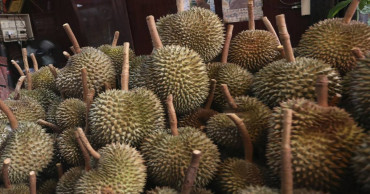Southeast Asia
Cambodia Travel Guide: Best Places to See and Amazing Things to Do
Located around the edge of Southeast Asia, Cambodia is a country bestowed with natural beauty and archaeological heritage. This small country has a mix of everything from luscious beaches down south to the ethereal jungle temples in the north. It’s a maze of amazements waiting to be explored. Let's take a look at the 10 most amazing tourist attractions in Cambida.
10 Most Popular Tourist Destinations in Cambodia
The Temple of Angkor Wat
It's difficult to find someone who hasn’t heard of the legendary temple of Angkor Wat. This UNESCO world heritage site was built in the 12th Century by the Khmer Empire. There’s a lot to explore other than the main temple of Angkor Wat. The temple of Bayon and Ta Prohm gets a special mention in this regard.
2 years ago
Economic cooperation needed among countries in South and Southeast Asia: PM tells outgoing Korean envoy
Prime Minister Sheikh Hasina on Tuesday (May 16, 2023) called for economic cooperation among the countries in South and Southeast Asia for mutual benefits of the people in the regions.
The prime minister said this while outgoing Ambassador of Republic of Korea, Lee Jang-keun, called on her at her official residence Ganabhaban.
PM’s press secretary Ihsanul Karim briefed reporters after the meeting.
He said that PM Hasina admired South Korea’s success in transforming into a developed country within a generation.
Also Read: PM delivers 4-point recommendations at 79th UNESCAP Session
She mentioned that this success inspired Bangladesh in its endeavour to steer the nation towards development and prosperity.
The PM recalled her two visits to South Korea, saying that during the second visit she witnessed the amazing development there.
While highly appreciating the socio-economic development of Bangladesh under the visionary leadership of Prime Minister Sheikh Hasina, the outgoing ambassador expressed deep appreciation for extensive cooperation and hospitality demonstrated by the PM and Bangladeshis during his tenure in Bangladesh.
Ambassador Lee shared with the Prime Minister recent milestone development in relations between Korea and Bangladesh in multiple areas such as trade, official development assistance, expatriate workers and investment in the year of 50th anniversary of South Korea-Bangladesh diplomatic ties in 2023, the South Korean Embassy in Dhaka said.
Read More:PM Hasina: Keep up the country’s dev momentum to foil anti-national conspirators
Ambassador Lee explained that the trade between South Korea and Bangladesh crossed the $3 billion mark in 2022 and $2 billion in 2021 for the first time, which was stagnant at around $1.5-1.8 billion over a decade before the Covid-19 pandemic.
2 years ago
MPs from Southeast Asia condemn Myanmar junta’s parties registration law as an assault on democracy
Parliamentarians from Southeast Asia have condemned the new Political Parties Registration Law passed by the Myanmar military junta as an assault on democracy, drafted by an illegitimate authority, and designed to favor its proxy party, the Union Solidarity and Development Party (USDP), ahead of the sham elections planned for this year.
The new law, passed on 26 January, imposes a series of criteria to register parties that are extremely difficult to meet for most of the 91 political organizations currently registered in Myanmar, except for the USDP.
For instance, according to Article 5(f), national parties are under the obligation to mobilize at least 100,000 members, 100 times more than the previous law, in 90 days, an impossibility given the instability and chaos that general Min Aung Hlaing threw the country into with the illegal coup he staged two years ago.
Now parties have two months to register under these draconian conditions, or they will be dissolved and declared illegal.
The National League for Democracy (NLD), the party in government at the time of the takeover in February 2021, has announced its refusal to recognize the new law and the election commission.
But other parties may face dissolution if the junta determines they have contacted a “terrorist organization,” including the People’s Defense Forces (PDFs), set up to fight against the junta, or the National Unity Government of Myanmar (NUG).
Read more: UN chief backs democracy for Myanmar 2 years after coup
“This law goes against all democratic principles not only because of its contents, specifically designed to make the military proxy USDP the only viable political party, but also because who has passed it. The junta led by Min Aung Hlaing has no legitimacy whatsoever to rule the country after an illegal coup d’état and two years of continuous atrocities against its own population, let alone to enact any law. The international community, starting with ASEAN, should condemn this new law in the strongest possible terms,” said Charles Santiago, Co-chair of ASEAN Parliamentarians for Human Rights (APHR), and former Member of Parliament in Malaysia on Tuesday.
The new law has been passed ahead of the general election planned by the junta this year.
According to the 2008 Myanmar Constitution, the state of emergency that was put in place by the junta after its coup on 1 February can only last two years, after which the government has the obligation to hold new elections.
Over this period, Min Aung Hlaing and his generals have unsuccessfully attempted to consolidate its power in the face of widespread popular resistance to military rule.
The junta is perpetrating crimes against humanity against its own people on a daily basis, including extrajudicial killings, indiscriminate aerial attacks against entire villages, arbitrary detentions and torture, often to death, of anyone deemed to be working with the opposition.
According to the local organization Assistance Association for Political Prisoners (AAPP), there are 13,689 political prisoners in the country, and the junta has killed at least 2,894 people, with the real numbers likely several times higher.
Read more: Myanmar's military regime must end its violence, release those unjustly detained: US
This all-out war waged by the junta against its own people has displaced hundreds of thousands, and ruined the Myanmar economy, creating a humanitarian catastrophe of gigantic proportions.
“In the terrible conditions currently prevailing in Myanmar, it is completely impossible to hold an election, especially if it is organized by the very same junta that created such conditions in the first place. This election is nothing but a desperate attempt by Min Aung Hlaing to legitimize his power, and will only result in even further bloodshed. The Myanmar people are not fooled by the junta’s electoral charade, and the international community should not be fooled either. It is imperative that international actors refuse to recognize the elections, and Min Aung Hlaing’s junta itself, and begin to seriously engage the democratic opposition in seeking the solution to the crisis in Myanmar,” said Santiago.
3 years ago
ASEAN leaders say region "no proxy" for any powers
Cambodian leader Hun Sen called for unity Sunday, telling a gathering including Russia, China and the United States that current global tensions have been taking a toll on everyone.
The prime minister, whose country holds the rotating chair of the Association of Southeast Asian Nations, said at the opening of the East Asia Summit that it was in the world’s common interest to cooperate to solve differences peacefully.
The comments come as regional tensions remain high between the United States and China over Taiwan and Beijing’s growing regional aspirations, and while the Russia invasion of Ukraine has disrupted global supply chains, causing rising energy and food prices far beyond Europe.
Without singling out any nation by name, Hun Sen said he hoped leaders would embrace a “spirit of togetherness in upholding open and inclusive multilateralism, pragmatism and mutual respect in addressing the existential and strategic challenges we all face.”
“Many current challenges and tensions have been hindering our past hard-earned efforts to promote sustainable development and causing greater hardship to people’s lives,” he said as he opened the meeting, which is running in parallel to the ASEAN group’s main summit.
Read: Putin won’t be at G20 summit, avoiding possible confrontation with US
Participants included U.S. President Joe Biden and Chinese Prime Minister Li Keqiang, and it comes just a day before the highly anticipated meeting between Biden and Chinese President Xi Jinping at the Group of 20 summit in Bali.
Russian Foreign Minister Sergey Lavrov was also taking part in the meetings, which also included the leaders of Australia, New Zealand, South Korea, Japan and others.
On Saturday, Biden promised that the U.S. would work with ASEAN, telling leaders of the strategically vital coalition that “we’re going to build a better future that we all want to see” in the region where U.S. rival China is also working to expand its influence.
He promised to collaborate to build a region that is “free and open, stable and prosperous, resilient and secure.”
“I look forward to continuing our work together with ASEAN and with each one of you to deepen peace and prosperity throughout the region to resolve challenges from the South China Sea to Myanmar and to find innovative solutions to shared challenges,” Biden said, citing climate and health security among areas of collaboration.
Read: Myanmar tops Asian summit’s agenda as global issues loom
Li Keqiang, meantime, told a meeting of ASEAN, China, Japan and South Korea that amid a “turbulent” global security situation, “unilateralism and protectionism are surging, economic and financial risks are rising, and global development is confronted with unprecedented challenges.”
As major economies in East Asia, Li said the group needed to “stay committed to promoting peace, stability, development and prosperity in the region and beyond, and to improving the people’s wellbeing.”
3 years ago
COVID cases rise in Southeast Asia, Middle East and Europe
The number of new coronavirus cases rose in Southeast Asia, the Middle East and Europe last week, while the number of deaths globally dropped by 16%, according to the World Health Organization’s latest weekly pandemic report issued Wednesday.
The WHO said there were 3.3 million new COVID-19 infections last week, marking a 4% decrease, with more than 7,500 deaths. But cases jumped by about 45% in Southeast Asia and the Middle East, and by about 6% in Europe. Southeast Asia was the only region to report a slight 4% increase in deaths, while figures fell elsewhere. Globally, the number of new COVID-19 cases has ben falling after peaking in January.
Salim Abdool Karim, an epidemiologist and vice-chancellor at the University of KwaZulu-Natal in South Africa, said the recent fall in COVID-19 numbers had reached “trough” levels and had not been seen much in the last two and a half years. He warned, however, that some countries, including Britain, were starting to see a slight resurgence in cases.
British health officials said last week there were early signs the country could be at the start of a new wave of infections driven by omicron variants, although hospitalization rates have so far remained “very low.”
The country dropped nearly all of its COVID restrictions months ago. Last week, the U.K. recorded a 43% rise in cases following the street parties, concerts and other festivities celebrating Queen Elizabeth II’s platinum jubilee earlier this month, that marked her 70 years as monarch.
Read: Biden visits clinic, celebrates COVID shots for kids under 5
Meanwhile in the U.S., officials began rolling out vaccines for the littlest children late last week, with shots for kids aged six months to five years.
Advisers to the U.S. Centers for Disease Prevention and Control authorized vaccines made by Pfizer-BioNTech and Moderna on Saturday, saying they helped prevent severe disease, hospitalization and deaths in young children.
Read: Govt hopes FY2023 will be final year of Covid pandemic: Document
While young children generally don’t get as sick from COVID-19 as older kids and adults, their hospitalizations surged during the omicron wave and American experts determined that benefits from vaccination outweighed the minimal risks.
3 years ago
ASEAN leaders hold summit with Myanmar’s general shut out
Southeast Asian leaders are meeting this week for their annual summit where Myanmar’s top general, whose forces seized power in February and shattered one of Asia’s most phenomenal democratic transitions, has been shut out for refusing to take steps to end the deadly violence.
Myanmar defiantly protested the exclusion of Senior Gen. Min Aung Hlaing, who currently heads its government and ruling military council, from the summit of the Association of Southeast Asian Nations.
Brunei, which currently leads the 10-nation bloc, will host the three-day meetings starting Tuesday by video due to coronavirus concerns. The talks will be joined by President Joe Biden and the leaders of China and Russia, and are expected to spotlight Myanmar’s worsening crisis and the pandemic as well as security and economic issues.
ASEAN’s unprecedented sanctioning of Myanmar strayed from its bedrock principles of non-interference in each other’s domestic affairs and deciding by consensus, meaning just one member can effectively shoot down a group decision. Myanmar cited the violation of those principles enshrined in the group’s charter in rejecting the decision to bar its military leader from the summit.
Read:ASEAN downgrades Myanmar presence in summit in major rebuke
But the regional group has few other options as the general’s intransigence further risked tainting its image as a diplomatic refuge for some of the most intractable tyrants in Asia.
A senior ASEAN diplomat, who joined an Oct. 15 emergency meeting where the foreign ministers decided to rebuff Myanmar, said those two principles bind but “will not paralyze” the bloc. The diplomat called ASEAN’s more forceful response “a paradigm shift” but added its conservative principles would likely stay.
“In serious cases like this, when the integrity and credibility of ASEAN is at stake, ASEAN member states or even the leaders and the ministers have that latitude to act,” said the diplomat, who spoke to The Associated Press on condition of anonymity because of a lack of authority to discuss the issues publicly.
Instead of Myanmar’s top general, the country’s highest-ranking veteran diplomat, Chan Aye, was invited to the summit as the country’s “non-political” representative, the diplomat said. It remains unclear if Chan Aye will attend.
Myanmar’s military-appointed foreign minister joined the online emergency meeting two weeks ago. It was held in a calm manner, although some ministers bluntly expressed their opposition to the Feb. 1 military takeover that ousted civilian leader Aung San Suu Kyi and her party, which overwhelmingly won last November’s vote. Singapore’s Foreign Minister Vivian Balakrishnan declared that his government still recognizes Suu Kyi and ousted President Win Myint, both of whom have been detained, as Myanmar’s legitimate leaders, according to the diplomat.
Malaysian Foreign Minister Saifuddin Abdullah, a staunch critic of the military’s seizure of power, told his ASEAN counterparts that the principle of non-interference cannot be used “as a shield to avoid issues being addressed” given that the Myanmar crisis has alarmed the region. In a separate online forum last week, he suggested officials and others “do some soul-searching” for ASEAN “on the possibility of moving away from the principle of non-interference toward `constructive engagement’ or `non-indifference.’”
ASEAN has been under intense international pressure to take steps to help end the violence that has left an estimated 1,100 civilians dead since the army took power and locked up Suu Kyi and others, igniting widespread peaceful protests and armed resistance. U.N. special envoy Christine Schraner Burgener warned last week that Myanmar “will go in the direction of a failed state” if violent conflicts between the military, civilians and ethnic minorities spiral out of control and the democratic setback was not resolved peacefully.
Suu Kyi’s party won in a landslide victory in 2015 after more than five decades of military rule. But the military remained powerful and contested her National League for Democracy party’s win in last November elections as fraudulent.
Read: Urgent action needed to end catastrophe in Myanmar: UN report
ASEAN has not recognized the military leadership although Myanmar remains a member.
The group “must take a bolder step to speak up against non-democratic overthrow of democratically elected government and crimes against humanity against the Myanmar people,” said Alexander Arifianto, an Indonesian expert on regional politics at Singapore’s S. Rajaratnam School of International Studies. “ASEAN needs to reform its decision-making process.”
ASEAN leaders agreed on a five-point contingency plan in an emergency meeting in April in Indonesia that was attended by Min Aung Hlaing. They called for an immediate end to the violence and the start of a dialogue to be mediated by a special ASEAN envoy, who should be allowed to meet all parties. But the military later repeatedly refused to allow the envoy to meet Suu Kyi and other political detainees in an impasse that is testing the regional bloc.
ASEAN admitted Myanmar in 1997 despite intense opposition from the U.S. and European countries, which then cited its military junta’s record of suppressing democracy and human rights. The other members of the bloc are Brunei, Cambodia, Indonesia, Laos, Malaysia, the Philippines, Singapore, Thailand and Vietnam.
4 years ago
Asian shares track rebound on Wall Street
Asian shares have rebounded from their retreat a day earlier, tracking Wall Street’s recovery from the Federal Reserve’s reminder it will eventually provide less support to markets.
Japan’s benchmark Nikkei 225 jumped 2.8% in morning trading to 28,785.24. Australia’s S&P/ASX 200 added 1.4% to 7,336.30. South Korea’s Kospi rose 0.6% to 3,260.11. Hong Kong’s Hang Seng edged up 0.1% to 28,522.78, while the Shanghai Composite gained 0.9% to 3,559.32.
Read:WTO talks on Trips waiver from June 30
Although the latest bout of jitters over a possible easing of help from the Federal Reserve and other central banks appears to have passed, analysts said rising coronavirus cases in the region remained a concern.
“Much of the region is dealing with renewed waves of COVID-19 infections. These waves, especially in the case of India, Indonesia and some other countries in Southeast Asia, are the most severe yet,” said Venkateswaran Lavanya at Mizuho Bank in Singapore.
On Monday, the S&P 500 snapped 1.4% higher, to 4,224.79, recovering nearly three-quarters of its worst weekly loss since February. Oil producers, banks and other companies that were hit particularly hard last week led the way.
The Dow Jones Industrial Average gained 1.8% to 33,876.97 and the Nasdaq composite rose 0.8%, to 14,141.48.
Investors are still figuring all the ramifications of the Fed’s forecast that may start raising short-term interest rates by late 2023. That’s earlier than previously thought. The Fed also began talks about slowing programs meant to keep longer-term rates low, an acknowledgment of the strengthening economy and threat of higher inflation.
Read:Australia says it’s reached a free trade deal with Britain
The market’s immediate reaction to last week’s Fed news was to send stocks lower and interest rates higher. Higher rates would make stock prices, which have been climbing faster than corporate profits, look even more expensive than they do already.
But it’s not like the Fed said it will hike rates from their record low of nearly zero anytime soon.
“If markets are worried about a march back to more normal monetary and fiscal policy as the economy recovers, it will be a very long march,” Barings chief global strategist Christopher Smart said in a note. In the meantime, support from both the Federal Reserve and the U.S. government should continue to help stock prices, even if they do look expensive compared with history, he said.
Companies whose profits are the most closely tied to the economy’s strength and inflation were among the market’s strongest on Monday.
Hess, Marathon Oil and Devon Energy all rose at least 6.9% as energy stocks rallied with the price of oil. Banks were also strong, with Bank of America up 2.5% and Wells Fargo climbing 3.7%.
High-growth companies able to flourish almost regardless of the economy lagged behind in a reversal from last week’s trend, when investors rattled by the Fed piled back into the biggest winners of the pandemic.
Amazon slipped 0.9%, and the lagging performance for tech meant the Nasdaq trailed other indexes.
Read:Odds of settling US-EU trade rifts? Hope may outrun progress
More bumps may be ahead for markets, which had been mostly quiet for weeks before the Fed’s announcement. Fed Chair Jerome Powell will speak before a House subcommittee on Tuesday about the Fed’s response to the pandemic.
In energy trading, benchmark U.S. crude picked up 13 cents to $73.25 a barrel in electronic trading on the New York Mercantile Exchange. It jumped $1.83 to $73.12 on Monday. Brent crude, the international standard, gained 23 cents to $75.13 a barrel.
In currency trading, the U.S. dollar rose to 110.39 Japanese yen from 110.31 yen. The euro rose to $1.1918 from $1.1914.
4 years ago
Hawaii police say thieves took $1K worth of pungent fruit
Police in Hawaii are investigating the theft of fruit valued at about $1,000 including durian, which is known for its powerful odor.
6 years ago




.jpg)

.jpg)






